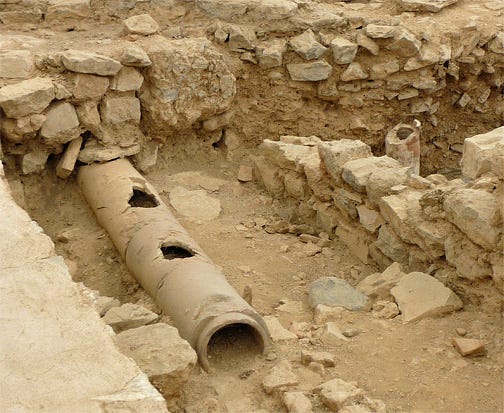Compendium
No. 1: A Compendium Entry for the Journey
“If someone has already experienced a version of the problem you are struggling with - wouldn’t you want to know about it? And if they figured out a way to solve it, wouldn’t you want to learn from them as soon as possible? That’s what our compendium project is all about.”
Compendium - noun.
/kəmˈpendēəm/
Definitions:
Merriam-Webster, contemporary 1-A brief summary of a larger work or a field of knowledge. 2-A list of a number of items.
Samuel Johnson’s Dictionary, 1755 1-Abridgment; Summary; Breviate; abbreviature; that which holds much in a narrow room; the near way. 2-After we are grown well acquainted with a short system or compendium of science, which is written in the plainest and most simple manner, it is then proper to read a larger regular treatise on the subject.” Isaac Watts, Improvement of the Mind “
MakeGoodHappen with Randy Lovejoy 1-”Followers of Jesus have been adapting their faith to their lives for more than 2,000 years. Many collected and wrote down the very best advice of their day; a compendium for future generations of Christians; that we might learn from their mistakes, adapt our lives according to their successes, and go farther in our spiritual journey than they were able to do.”
Etymology: enters English from the 1580s “The word compendium arrives from the Latin word compeneri, meaning "to weigh together or balance". The 21st century has seen the rise of democratized, online compendia in various fields.” -Wikipedia
How It MakesGoodHappen:
Benjamin Disraeli left the British parliament meeting “with a mass of papers in one hand and with his pocket-handkerchief applied to his nose.” It was 1858 and “The Great Stink” was not only crinkling the noses of the government leaders of Britain but of every Londoner trying to get on with their lives. If only the citizens of that great city had inherited a compendium of knowledge from the Minoan people who had lived 3,000 years earlier none of this would have happened.
In 1500 BCE the Minoan city of Knossos served its population of 100,000 people with an elaborate system of indoor plumbing, bathtubs, the first known flush toilet, and an underground sewage system. If a book explaining this knowledge and technology had been passed on to Londoners, they could have adapted it to their own city and saved thousands of lives.
62 CE would have been a perfect time to build that underground sewage system using Knossos as a blueprint. A year earlier, in 61 CE, Boudica, the Queen of the ancient British Iceni (ai·see·nai) tribe, burned Londonium, as it was then called, to the ground. The city had to begin again from the rubble up. But at that time in history, Knossos had fallen into ruin. Its knowledge was buried deep under the sands of time. Londoners simply had no way to learn of that technology.
They did improve their port facilities in the rebuild, however, and this led to expanded trade and a growing population. By the time of Queen Elizabeth I, London had the same population as Knossos did at its peak. But the English approach to sewage left a lot to be desired. A typical Londoner would awake on the second floor of their Tudor-style home, relieve themselves in their chamber pot, and pour its contents out onto the streets below. They didn’t bathe regularly so they would put the empty “Jordan,” as Shakespeare calls it in his play Henry IV, under their bed, brush off their hands and head downstairs for breakfast. Then they would walk out their front door and onto the same street that was filled with the contents of their family’s and their neighbors’ chamber pots.
Life continued in London, generation after generation, without a sewage system like the Minoans. Instead, they dug 200,000 cesspools across the city. The contents of the cesspools and streets, along with the city's industrial and slaughterhouse waste, would slowly leech a key source of the city’s unfiltered drinking water, the River Thames. Just before “The Great Stink,” 10,000 citizens of London died in a cholera outbreak of 1853-1854, because of that polluted water. Then came the summer of 1858.
June, July and August are generally quite pleasant in London with temperatures in the 70s. But in 1858 they moved up toward the mid-90s. The combination of heat and particulate matter in the Thames produced odors so noxious that parliament considered moving their offices to Oxford. Instead, in August of that year, they passed a bill setting aside 2.5 million pounds (between 240 million and a billion pounds today) for the construction of a new underground sewage system for the city. It would take 10 years to complete the project.
The Compendium Project of RandyLovejoy.com:
If someone has already experienced a version of the problem you are struggling with - wouldn’t you want to know about it? And if they figured out a way to solve it, wouldn’t you want to learn from them as soon as possible?
That is what our compendium is all about.
Followers of Jesus have been adapting their faith to their lives for more than 2,000 years. Many collected and wrote down the very best advice of their day; a compendium for future generations of Christians; that we might learn from their mistakes, adapt our lives according to their successes, and go farther in our spiritual journey than they were able to do.
Though we live in very different circumstances than they did, their experience inspires our courage and creativity as we seek to make good happen in our contemporary lives. Each entry of our compendium will focus on words, phrases, or biographical stories that will help you take your next step.
For example, Isidore of Seville left us an incredible compendium known as “The Etymologies.” Isidore lived through a tumultuous political and religious period in Spanish history. The Western Roman Empire had collapsed. In its wake, the Germanic Visigoths gained control of his homeland. The Byzantines of the Eastern Roman Empire were also trying to gain control of the region. Young Isidore’s family had to flee their native Cartagena in the chaos and Isidore lived through the murder of four successive Visigoth Kings. Yet during his lifetime, he took it upon himself to make the best knowledge of ancient Greece, Rome, and early Christianity accessible to future generations. His compendium was so successful that it was read and quoted by 7th-century Irish Monks, an 11th-century University lecturer, an Italian poet in the 14th century, and a person compiling a dictionary in the 16th century. As one expert put it, his compendium “…was arguably the most influential book, after the Bible, in the…Latin West for a thousand years.” (p. 3)
There are many other compendiums we will draw from. In the 16th century, Erasmus of Rotterdam gathered more than 4,000 proverbs into a collection called The Adages of Erasmus. His motivation, well, I will let him tell you: “…when I considered the important contribution made to elegance and richness of style by brilliant aphorisms, apt metaphors, proverbs and similar figures of speech, I made up my mind to collect the largest possible supply of such things from approved authors of every sort and arrange them in its appropriate class, to make them more accessible to those who wish to practice composition with a view to securing a rich and ready diction.” -(Ep 1341A:576-82)
And in the 18th century, Isaac Watts, famous for his lyricism in hymns like “Joy To The World,” also wrote two compendia entitled, Logic and Improvement of the Mind,. Both of these texts were assigned reading in schools for at least the next 100 years.
Though we live in very different circumstances than these people did, their experiences inspire us to be courageous and creative as we seek to make good happen in our everyday lives. Each entry of our compendium will focus on lesser-known words, phrases, or biographical stories that will help you take your next step. The collection begins with this post. And it will grow consistently, post by post, stored alphabetically in our archive for your use as you have need.






